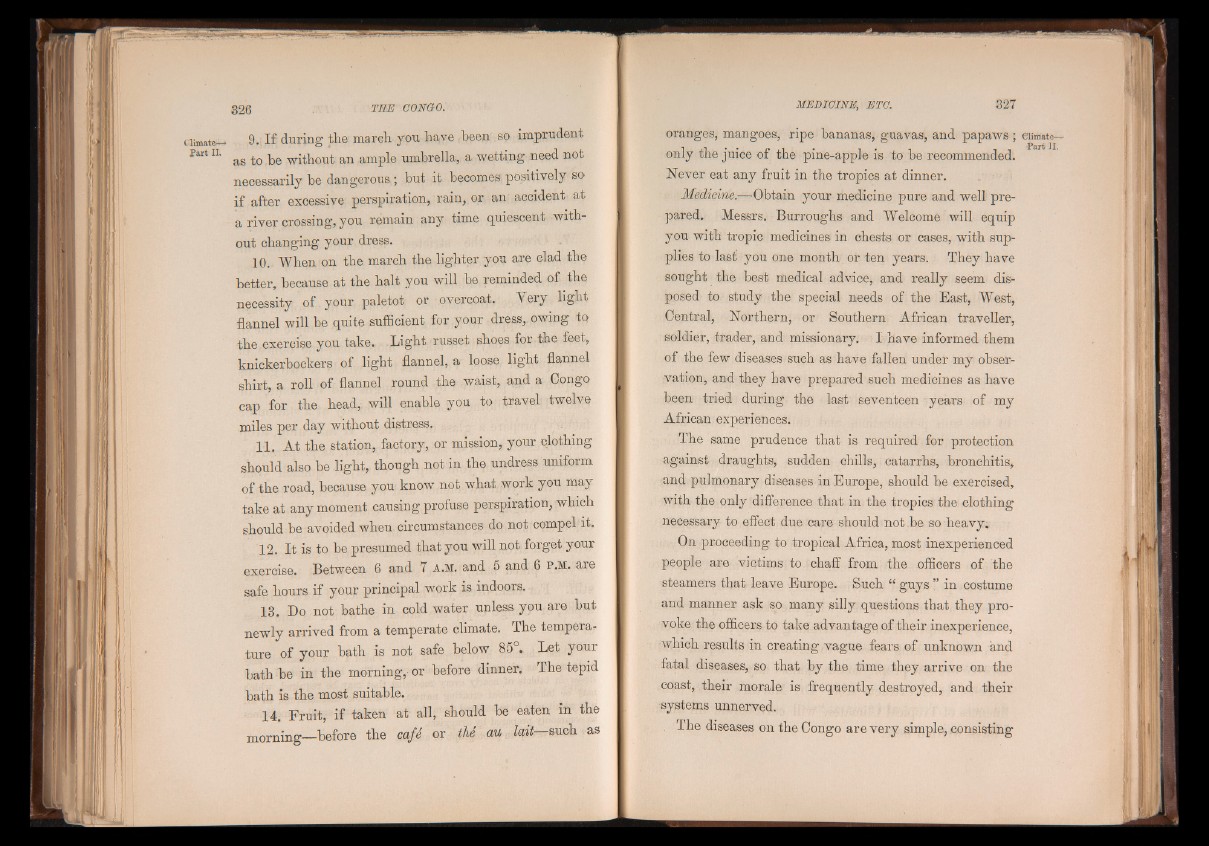
9. If during the march you have .beep, so imprudent
as to he without an ample umbrella, a wetting need not
necessarily he dangerous/, hut it becomes positively so
if after excessive perspiration, rain, or an; accident at
a river crossing, you remain any time quiescent without
changing your dress.
10. When on the march the lighter you are clad the
better, because at the halt you will be reminded of the
necessity of your paletot or overcoat. Yery light
flannel will be quite sufficient for your dress, owing to
the exercise yo.u take.. Light russet shoes for the feet,
knickerbockers of light flannel, a loose light flannel
shirt, a roll of flannel round the waist, and a Congo
cap for the head, will enable you to travel twelve
miles per day without distress.
11. At the station, factory, or mission, your clothing
should also he light, though not in the undress uniform
of the road, because you know not what work you may
take at any moment causing profuse perspiration, which
should be avoided when circumstances do not compel it.
12. It is to he presumed that you will not forget your
exercise. Between 6 and 7 a .m . and 5 and 6 p .m . are
safe hours if your principal work is indoors.
13. Do not bathe in cold water unless you are hut
newly arrived from a temperate climate. The temperature
of your hath is not safe below 85°. Let your
hath he in the morning, or before dinner. The tepid
bath is the most suitable.
14. Fruit, if taken at all, should he eaten m the
morning—before the cafe or thé au lait such as
oranges, mangoes, ripe bananas, guavas, and papaws ;
only the juice of the pine-apple is to he recommended.
Never eat any fruit in the tropics at dinner.
Medicine.—Obtain your medicine pure and well prepared.
Messrs. Burroughs and Welcome will equip
you with tropic medicines in chests or cases, with supplies
to last you one month or ten years. They have
sought the best medical advice, and really seem disposed
to study the special needs of the East, West,
Central, Northern, or Southern African traveller,
soldier, trader, and missionary. I have informed them
of the few diseases such as have fallen under my observation,
and they have prepared such medicines as have
been tried during the last seventeen years of my
African experiences.
The same prudence that is required for protection
against draughts, sudden chills, catarrhs, bronchitis,
and pulmonary diseases in Europe, should be exercised,
with the only difference that in the tropics the clothing
necessary to effect due care should not .be so heavy;
On proceeding to tropical Africa, most inexperienced
people are victims to chaff from the officers of the
steamers that leave Europe. Such “ guys ” in costume
and manner ask so many silly questions that they provoke
the officers to take advantage of their inexperience,
which results in creating vague fears of unknown and
fatal diseases, so that by the time they arrive on the
coast, their morale is frequently destroyed, and their
systems unnerved.
The diseases on the Congo are very simple, consisting
€liiriate—r
Part II.